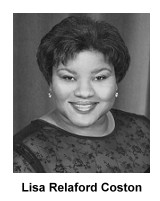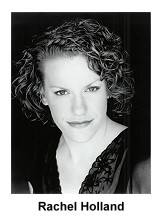
ReviewsLisa Relaford Coston Sings Mahler's KindertotenliederOn February 16, 2007 at the Ferguson Center's Music and Theatre Hall mezzo-soprano Lisa Coston and pianist Jeffrey Brown gave a stunning performance of Gustav Mahler's (1860-1911) Kindertotenlieder (Songs on the Death of Children). They demonstrated a seamless communication of text and music. Unfortunately the lights went down immediately after we received the text and translations. Though sung in German there was no way to miss the emotional content of the words. Their approach was as gentle as a child and as powerful as the overwhelming sadness of a child's death. Ms. Coston's effortless pianissimos and gloriously beautiful sound was enhanced by Dr. Brown's appropriate touch at the piano. The clear communication went straight to the heart, leaving listeners stunned by the beauty and drained by the sad pity of it all.
I would venture a guess that few, if any of us, had heard a live performance of this music before and certainly not with piano. The various recordings that I have lived with for 40 years are all with orchestra. Stripping away the lush string sound and the rich colors of Mahler's orchestration we are left with a spare but complex piano and the voice's soul-wrenching vocal journey through these poems by Friedrich Rückert (1788-1866). In the summer of 1901 Mahler set the first three poems. The following year a 42 year old Mahler married Alma Schindler and they had a daughter Marie (b.1902). Two summers later he completed the cycle and they had a second daughter Anna (b.1904). In 1907 the cycle took on a new meaning when Mahler's beloved daughter Marie died of scarlet fever. He was emotionally devastated and shortly after he was diagnosed with a serious heart condition. After two seasons with the New York Philharmonic he returned to Vienna where he died from a bacterial infection at age 51. In a lighter mood, the second half of the recital brought many of our favorite songs by Ms. Coston. Richard Hundley's (b.1931) Waterbird with its soaring vocals, Hall Johnson's (1887-1970) comedic Scandalize My Name, Moses Hogan's (1957-2003) profound Give Me Jesus and Margaret Bond's (1913-1972) consoling He's Got the Whole World in His Hands. There were new songs also, like Since God ... by Joseph Pollard White (b.1957) and Jean Berger's (1909-2002) La Mariquita. The story tells how Mariquita with her youth and long, black braids refused the love offered by a suitor but as her black braids ashen with age she wants his attention. He is no longer interested. There is a connection between Berger and Christopher Newport University since he gave master classes there at least twice. Our performers are both on the music faculty at the University. Their last song was a brilliant tour de force, A Word on My Ear by Donald Swann (1923-1994). With sour notes and an incomplete melody and every other violation of what we think of as music, it was outrageously funny and performed to a t by voice and piano. Last fall it was Rachmaninoff songs and now Mahler. Ms. Coston is at the peak of her vocal artistry and recital by recital she is exploring new vocal works and sharing them with her audience. I am thrilled to be one of her most enthusiastic listeners. Rachel Holland Gives a Recital at CNU For 20 years Vanessa has waited for the return of her lover Anatol, struggling to remain just as beautiful and youthful as she was then. It is no wonder that she was so intense in this aria. It turns out that this is Anatol's son. They marry, he gets her young cousin Erica pregnant and Erica watches as the couple go off together since she can not bear to destroy Vanessa's illusion. Continuing the theme of the opening song, Ms. Holland followed with four songs from France by Henri Duparc (1848-1933). Duparc was a perfectionist who destroyed all but sixteen of his songs. In Au pays où se fait la guerre (To the land where war is being fought), the singer's lover has gone off to war and she sits in her tower in a lovely, natural setting. Moonlight and mystery in the piano brings the sound of striding footsteps below. It is only the page. She waits, remaining emotionally overwrought. In Extase (Ecstasy), a brief, lovely moment in time is so precious, so fleeting and captured perfectly in the beauty of her sound. Chanson triste (Sad song) and L'invitation au voyage (Invitation to a journey) are languorous, sensual songs with fine piano work and fully engaged singing. All the music in the recital comes from the 20th century. Benjamin Britten (1913-1976) wrote his opera Peter Grimes in 1945. From it we heard the Embroidery Aria. Ellen pours out her passion and her heartbroken feelings for this misery of a man Grimes who is a seafarer. He has slapped her and allowed the death of a second orphan cabin boy. I hear anger in her voice as the song ends! In conversation after the recital we learned that Ms. Holland had performed the roles of Ellen and Vanessa while a graduate student at Indiana University. This experience allowed her performance to offer a much deeper understanding of the characters she created. One of the most lushly romantic arias from all of opera is Marietta's Lied from Die Tote Stadt by Erich Korngold (1897-1957). There is a tear in the sweetness of the piano and Ms. Holland sang with a meltingly lovely sadness. This aria is all most of us know from the opera which is rarely performed. The piano postlude has a lightness after this intense, vocal meditation on love and loss of the beloved to death followed by speculation on resurrection. The spacious lyricism of Sergey Rachmaninoff's (1873-1943) piano compositions is there in his songs. I only wish that the boldness that is in the voice in these songs had been matched in Dr. Brown's playing. After all, Rachmaninoff was as grand concert pianist and wrote music that made the performers equal partners. The singer is nostalgic for his home in Georgia, so much so that he says Oh, Never Sing to Me Again. You hear a hopping frog in the piano in The Water Lily. The shy frog averts her eyes from the sky, only to find the moon reflected in the water. With a sort of French melodie sound in the piano, The Dream, which is really about the joys of sleep, builds energy in the piano which is overtaken by the vocal sound. Spring Waters celebrates the exaltation of spring. The piano is restrained here, letting the voice shine. Rachel Holland appeared as Mrs. Hayes in Virginia Opera's Susanna by Carlyle Floyd in November, 2006. This recital, her first in our area, was delayed from February. We heard her in the Music and Theatre Hall at CNU on April 21, 2008. Here is an artist poised on the brink of a potentially fabulous career. We certainly hope to hear her soon in a leading role at the Harrison Opera House.
|
|
Back to Top More CNU |
 For example, in the fourth song, In diesem Wetter (In this
weather) a raucous piano sets the stage for a terrible storm. Our
singer's serious face and restrained demeanor found her doing battle
with the storm, only to become gentle and pained as she realizes
that the children cannot be harmed - they are "covered by the hand
of God." The applause was subdued as the music ended. It is hard
to celebrate the superb performance when you are lost in such profound
sadness.
For example, in the fourth song, In diesem Wetter (In this
weather) a raucous piano sets the stage for a terrible storm. Our
singer's serious face and restrained demeanor found her doing battle
with the storm, only to become gentle and pained as she realizes
that the children cannot be harmed - they are "covered by the hand
of God." The applause was subdued as the music ended. It is hard
to celebrate the superb performance when you are lost in such profound
sadness. These
dramatic, soaring vocal lines ended the aria "Do you still love
me as once you did? For if you do not, I shall ask you to leave
this house this very night!" from Vanessa by Samuel Barber (1910-1981).
Rachel Holland, who is Director of Vocal Studies at Christopher
Newport University, chose to open her first Tidewater recital with
this demanding showpiece, just a beginning demonstration of how
confident she is in her instrument, power and training. Pianist
Jeffrey Brown, also on the faculty of CNU, underscored the emotional
intensity of Do not utter a word from the Gothic tale written
by Isaak Dinesen, pseudonym of Karen Blixen (1885-1962) and adapted
for the stage by Gian Carlo Menotti (July 7,1911 - February 1, 2007),
Barber's life partner.
These
dramatic, soaring vocal lines ended the aria "Do you still love
me as once you did? For if you do not, I shall ask you to leave
this house this very night!" from Vanessa by Samuel Barber (1910-1981).
Rachel Holland, who is Director of Vocal Studies at Christopher
Newport University, chose to open her first Tidewater recital with
this demanding showpiece, just a beginning demonstration of how
confident she is in her instrument, power and training. Pianist
Jeffrey Brown, also on the faculty of CNU, underscored the emotional
intensity of Do not utter a word from the Gothic tale written
by Isaak Dinesen, pseudonym of Karen Blixen (1885-1962) and adapted
for the stage by Gian Carlo Menotti (July 7,1911 - February 1, 2007),
Barber's life partner.